No Safe Place in Israel, Hezbollah Chief Warns as Tensions Rise
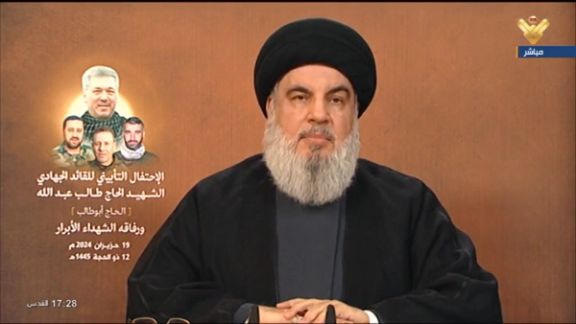
Hezbollah leader Hassan Nasrallah said Wednesday that his forces, armed and trained by Iran, can target anywhere in Israel, in the event of a full-blown war.

Hezbollah leader Hassan Nasrallah said Wednesday that his forces, armed and trained by Iran, can target anywhere in Israel, in the event of a full-blown war.
In his televised speech Wednesday, Nasrallah said “there will be no place safe from our missiles and our drones” in Israel.
One day earlier, the Hezbollah-affiliated outlets had published footage that they claimed were shot by a drone flying over residential and military sites deep in Israeli territory.
The Lebanese group is widely believed to have amassed more than 100,000 missiles, and its leader has repeatedly boasted about weapons that he claims have not been used so far in its eight months of low-key but constant fighting with Israel.
In his Wednesday remarks, Nasrallah also reminded his audience that some Iranian drones and missiles did get through Israeli air defense systems despite support from the US and other European countries.
On 13 April, Iran launched hundreds of missiles and drones in its first ever direct attack on Israel in retaliation for the targeting of its consulate in Damascus twelve days earlier.
Nasrallah also threatened Cyprus for the first time, accusing the small Mediterranean country of helping Israel.
“The Cypriot government must be warned that opening Cypriot airports and bases for the Israeli enemy to target Lebanon means that the Cypriot government has become part of the war and the resistance will deal with it as part of the war.”
Cyprus has in the past allowed Israel to use its airspace for air drills, but not during conflict, as far as public information goes.
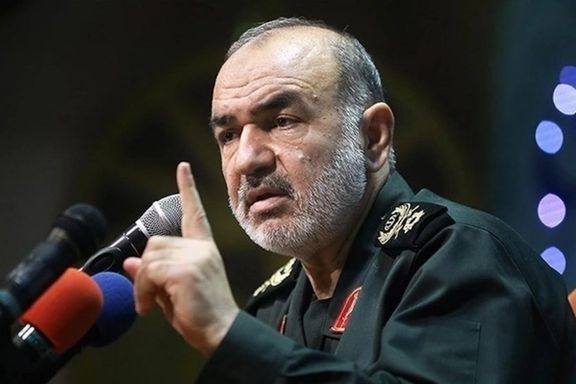
Iran has been able “to impose” its power “on the enemy,” Hossein Salami, commander in chief of the Revolutionary Guard said in a public gathering with educators on Wednesday.
Salami reiterated the official rhetoric that Islamic Republic’s enemies have been at work for 45 years to undermine and weaken “the revolution” using a wide variety of means and tactics. However, he insisted that the Islamic Republic has defied all the odds has not been deterred.
“We have been able to absorb and neutralize all these different pressures and impose the magnificent power of a nation on an arrayed world of enemies,” the IRGC chief commander said.
Iran’s rulers use the term ‘enemy’ to refer mainly to the United States and sometimes to Israel and European powers.
Claiming that the Islamic Republic has become the focus of the enemy, he stated, “The enemy is simultaneously targeting all pillars of the system [regime] and the revolution, converging all vectors of threat at a single point. This synergy and maximum pressure from the enemy have placed us in an exceptional position.”
Salami also told his audience that sanctions against Iran have not been effective, even though annual inflation has been hovering at above 40% for the past five years and the government has faced repeated rounds of popular protests. Despite harsh sanction during the Trump administration and some pressure since 2021, Iran has avoided a possible costly military confrontation with Israel and the United States. Its leaders insist that although the country has been enduring economic challenges, instead it enjoys security.
“If you see that you have security at the height of confrontation, it means you possess power,” Salami proclaimed. “If the enemy realizes that you can overcome their sanctions, they will try to encircle you. And if you see that sanctions have become ineffective in this country, it is because you possess power,” he added.
When the United States withdrew from the JCPOA nuclear deal in 2018 and imposed oil export sanctions, Iran lost almost 90% of revenues from selling around two million barrels per day. However, after the Biden administration took office, oil exports began to increase, with China buying almost all the shipments. After three years, Tehran is now selling over 1.3 million barrels per day to China with an estimated annual income of around $37 billion.
At the same time, it has continued expanding its nuclear program and has continued to support an array of armed proxy groups in the region that attack Israel and occasionally US forces. Critics of the Biden administration insist that deterrence should be re-established.
"They seized our ships, so we seized theirs. They wanted to capture our oil tankers en route to Venezuela, but as soon as we conducted a drill in front of their eyes, they backed off. They attacked some of our ships at sea, but when their ships were attacked, they realized that they couldn't engage with this country," Salami boasted.
He also made a veiled reference to Iran’s potential ability to disrupt oil supplies in the Persian Gulf. "Today, your exports and imports are conducted with complete security due to your power,” Salami told his audience, adding, “and in this matter, there is no difference between Trump and Biden. During Trump's time, we attacked Ain al-Asad and shot down the Global Hawk. They realized that if they wanted to stand against Iran, Iran, with its influence on the global economy, could impact the world through its actions."
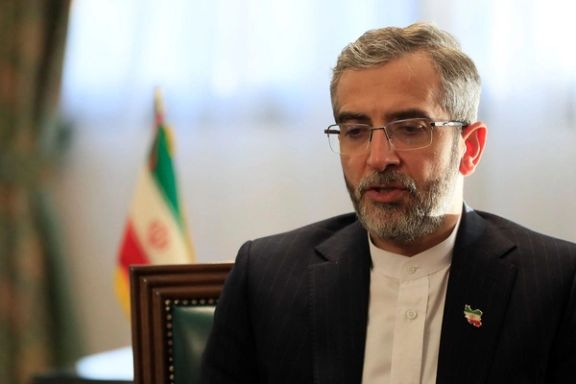
Iranian and Taliban officials have discussed potential "joint action" against Israel amid the war in Gaza and chances of a war between the Lebanese Hezbollah and Israel escalating.
During a Monday phone call, Ali Bagheri Kani and Amir Khan Muttaqi, the respective Foreign Ministers of Iran and the Taliban, underscored the imperative of unified Islamic efforts to exert pressure on Israel, particularly through the Organisation of Islamic Cooperation.
Iran's ambassador in Kabul recently declared that "martyrdom" forces from the Taliban would also be dispatched to Gaza, where Iran-backed Hamas is fighting Israel, if necessary. This is while Israeli forces control the borders of the strip.
Despite Iran seeking the Taliban's support in the event of further escalation, Aminullah Habibi, a senior international relations analyst, indicated to Afghan International that while Iran might sway some Afghans, the Taliban as a cohesive entity is unlikely to engage in a war against Israel.
However, Iran has been funding the Taliban to support its fight against the US, as disclosed by former US Defense Department adviser Carter Malkasian, who revealed that since 2012, Iran has given annually funding in the region of $100 million.
The relationship between Iran and the Taliban has been fraught with tension, primarily due to water rights and border security issues. The Helmand River, crucial for Iran’s eastern provinces, has been a major point of contention. Iran accuses Afghanistan of violating the 1973 Helmand River Treaty by restricting the river's flow, impacting agriculture and drinking water. In May last year, late Iranian President Ebrahim Raisi warned the Taliban about disregarding Iran's water rights, but the Taliban dismissed the threat mocking him, leading to heightened tensions and fatal border clashes.
The poorly demarcated Iran-Afghanistan border has also become a hotspot for smuggling, illegal crossings, and skirmishes. The Taliban's resurgence has exacerbated such issues, with frequent incidents of violence and mutual accusations.
Adding to these challenges is the influx of Afghan refugees into Iran following the Taliban's takeover has strained Iran's resources and infrastructure, heightening security concerns.
Since October 7, Iran's proxies in Syria, Yemen, Iraq and Lebanon have been attacking the Jewish state in allegiance with Hamas. On the deadliest single day for Jews since the Holocaust, over 3,000 Hamas forces invaded Israel killing 1,200 mostly civilians and taking another 251 hostage.
Since then, in allegiance with Hamas, Hezbollah has launched over 3,300 projectiles towards Israel with around 200,000 people displaced both on Lebanon's southern border and in Israel's north.
Israeli political and military chiefs have declared that measures are now in place should a war in Lebanon be authorized, as tensions between the two nations are the worst since the second Lebanon war.
Recent warnings from US officials cautioned Israel against a "limited" or "regional" war in Lebanon, highlighting the risk of uncontrollable escalation and potential Iranian intervention.
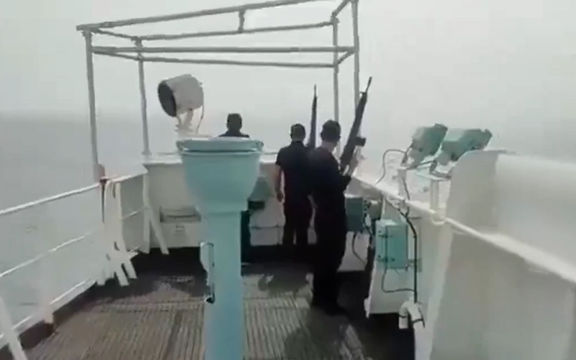
The cargo ship that was struck on June 12 by Yemen's Houthis, identified by the Iran-backed rebels as M/V Tutor, "is believed to have sunk" in the Red Sea, the British maritime authority said.
The Liberian-flagged, Greek-owned bulk carrier M/V Tutor was hit by an unmanned surface vessel, apparently in the first case where the Houthis successfully use such a weapon.
The June 12 attack caused severe flooding and damage to the engine room.
Sailors assigned to the Dwight D. Eisenhower Carrier Strike Group airlifted the crew out on Saturday, NAVCENT said, adding that one civilian sailor remained missing.
The US Naval Forces Central Command (NAVCENT) said on Sunday that it had rescued the crew from the M/V Tutor.
This is the second vessel sinking after being hit by the Houthis, since October 2023 when the Yemeni rebels started their campaign against commercial vessels navigating the Red Sea and the Arabian Sea.
The attacks began after Iran's Supreme Leader Ali Khamenei called on Muslim nations in early November to blockade Israeli trade in the wake of the Gaza war.
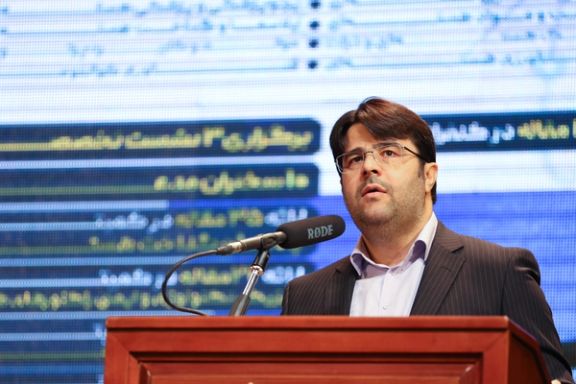
The UN’s International Atomic Energy Agency reportedly paid hard cash to a US sanctioned Iranian regime atomic weapons scientist in Vienna in early 2022 and sent Tehran-controlled nuclear researchers to Russia for training.
The mass circulation German tabloid Bild on Sunday reported that it obtained “confidential files" of the Iranian atomic program.
The Bild wrote “As the documents show, representatives of the UN agency met with Javad Karimi-Sabet in Vienna in early 2022…. Karimi-Sabet has been on a US sanctions list since 2020 and is considered one of the masterminds in the development of the Iranian atomic bomb. According to internal emails, the IAEA paid Karimi at the meeting. Since a bank transfer was not possible due to the sanctions, the scientist was paid the money in cash.”
Karimi-Sabet is the vice chairman of the Atomic Energy Organization of Iran (AEOI).
The IAEA told the Bild that US sanctions are not applicable to its work and did not deny the payment.
“As part of the United Nations (UN) system, the IAEA follows the UN sanctions regulations and does not implement national sanctions regulations, “noted the IAEA.
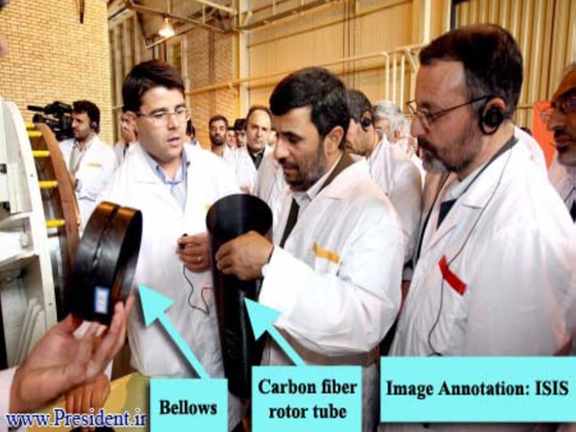
When asked about the Bild story, which was headlined “Did the UN help the mullahs build the atomic bomb?, David Albright, one of the world’s leading experts on the Islamic Republic of Iran’s illicit nuclear program, told Iran International “I do not agree with the claim that the IAEA is contributing to Iran's nuclear weapons program. Nonetheless, there are many issues with the IAEA's technical support programs when it comes to states violating their safeguards agreements in fact or by intention. Today, Iran should not be benefiting from IAEA technical support programs.”
Albright, physicist and founder and president of the Institute for Science and International Security in Washington, D.C., added “The visit by Karimi is deeply troubling because of his role in establishing Iran's centrifuge program. See photo from our website from earlier days; In this picture from 2008, President Ahmadinejad holds a carbon fiber rotor tube; visible is also a bellows. Karimi is standing to the left of Ahmadinejad, who was touring Natanz. Karimi is likely still working on centrifuges, based on some of his recent publications. “
Albright added Karimi-Sabet “worked in other sensitive nuclear areas, not just on centrifuges.”
The Bild reported that the confidential documents revealed that the IAEA launched funding programs for Iranian nuclear science. The IAEA said, according to Bild’s information, that project “IRA2018001” was coordinated with the Iranians in 2019, with the aim of “Improving the skills and knowledge of scientists and improving the hardware and software infrastructure, which contribute to improving the operation and use of research reactors.”
The paper added “The IAEA also financed numerous training programs for scientists from Tehran in Russia…selected experts were sometimes under the wing of Putin's Rosatom for weeks - the state authority is also responsible for the civil and military use of nuclear energy.”
An IAEA spokesman confirmed the training to the Bild; "The IAEA's Technical Cooperation (TC) program supports member states in (...) development and management of nuclear knowledge." The IAEA added that it ensured that the Iranian participants did not obtain knowledge about nuclear weapons during the training.
Ukraine’s president has long suspected that the quid pro quo between Iran and Russia entailed Tehran receiving support for its atomic weapons program from Moscow in exchange for providing lethal drones to Russia in its illegal war to conquer the Ukraine.
Separately but related, in March, 2023 Fox News Digital reported that the clerical regime in Tehran allegedly secured secret deals with Russia to guarantee deliveries of uranium.
According to the Fox News article, Putin agreed to return enriched uranium that it received from Iran if a prospective nuclear deal collapses. According to the intelligence officials cited in the Fox report, the Iranians exploited the opportunity during Putin’s pressing need for drones and demanded a "nuclear guarantee" that would enable Iran "to quickly restore its uranium stock to the quantity and enrichment levels it had maintained before the resumption of the agreement."
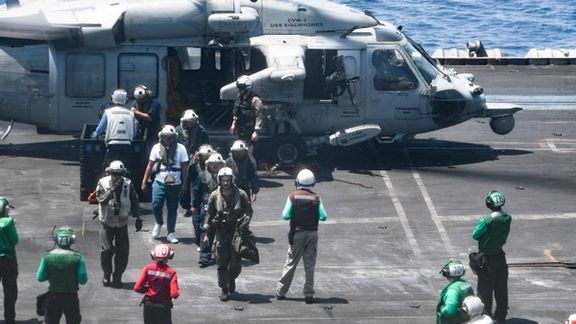
US and British forces launched at least six airstrikes on Yemeni Houthi targets on Monday in retaliation for repeated attacks on commercial vessels in the Red Sea area, Houthi media reported.
The attacks targeted Yemen's Hodeidah International Airport and four strikes on Kamaran Island near the port of Salif off the Red Sea, Al-Masirah TV, the main television news outlet run by Yemen's Houthi movement, said on Monday.
The strikes on Kamaran mark the first time US-led coalition forces have targeted the island since airstrikes on Houthi targets began early this year.
They follow the Iran-backed Houthis' first successful armed maritime drone strike and other missile assaults that damaged the Tutor and Verbena cargo ships last week. Both vessels are abandoned and adrift - with Tutor at risk of sinking, military and security experts said.
Meanwhile the Pentagon said that Russian, Chinese and Iranian naval vessels in the vicinity of Tutor did not respond to emergency calls for assistance. The Houthis have reportedly given assurances to Russia and China of not attacking their commercial ships.
“Among the ships that were in response distance and did nothing to assist the M/V Tutor were Iranian, Russian and Chinese naval vessels. The Tutor remains in the Red Sea and is slowly taking on water while waiting for salvage vessels to help with recovery,” Deputy Pentagon Press Secretary Sabrina Singh said during her press briefing on Monday.
The Houthis, who control Yemen's capital and most populous areas, have attacked international shipping in the Red Sea since November in solidarity with Palestiniansin Gaza. In that time, they have sunk one ship, seized another vessel and killed three sailors in separate attacks. The attacks began after Iran’s Supreme Leader Ali Khamenei called on Muslim Nations in early November to blockade Israeli trade.
Yemen's internationally recognized government believes Houthi fighters in the past have used Kamaran Island and Port Salif as a site to launch their Red Sea attacks as well as hide stockpiles of missiles and drones in its salt mines, two military sources within the government told Reuters.
The 10-kilometers of water that stretch from the port of Salif to Kamaran Island are also part of the route that ships must transit through to reach their next port of call.
Military and security officials said the Liberian-flagged Tutor has been taking on water since the Houthis hit it with an armed boat drone and air missiles on Wednesday in the Red Sea. That attack damaged the Tutor's engine room and caused severe flooding.
Rescuers from the U.S. Dwight D. Eisenhower Carrier Strike Group aircraft carrier have airlifted the Tutor's crew to safety. One sailor remains missing.
U.S. Central Command separately said crewmembers from the Palau-flagged Verbena issued a distress call this weekend due to uncontrolled fires sparked by two Houthi missile strikes in the Gulf of Aden on Thursday.
The Cayman Islands-flagged Anna-Meta wheat carrier rescued Verbena's crew and is transporting them to safety, CENTCOM said.
Despite reprisals from the U.S.-British coalition and other navies, the Houthis have escalated their campaign against commercial vessels in one of the world's busiest shipping lanes.
Their missile and drone attacks have forced ship owners to reroute vessels away from the vital Suez Canal shortcut - sending costs and delays cascading through the vital ocean shipping industry that transports about 80% of international trade.